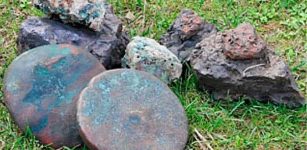Persephone: Greek Goddess Of The Coming Spring And Lady Of The Land Of The Dead
A. Sutherland - AncientPages.com - Persephone is a goddess of the Land of the Dead and sprouting grain and fruit in Greek mythology. In Roman mythology, she is identified with Proserpine.
Her attribute was poppy and pomegranate fruit, so she was also associated with spring, flowers, life, and vegetation before becoming queen of the underworld.
Persephone Goddess. Credit: Adobe Stock - Amelie
Loved by all, Persephone was the daughter of Zeus and Demeter, and her companions were Athena, Artemis, and the nymphs, the Oceanids.
She liked Zeus' brother Hades who ruled the Land of the Dead. Zeus promised to give him Persephone as his wife.
Hades Appears In A Golden Chariot
One day, she was playing in the meadow, picking flowers like lilies and daffodils. Suddenly, she saw a flower of unexpected beauty. However, it was not an ordinary flower, but the one which was grown by the earth goddess Gaia at the special request of Hades. When Persephone grasped the flower, the god Hades appeared before her in a golden chariot drawn by four dark horses.
He grabbed Persephone, lifted her onto the chariot, and disappeared into the underworld. No one saw this abduction of Persephone, except for the Sun god – Helios.
This abduction, however, was not evildoing because Hades did it with the consent of Persephone's father, Zeus.
Persephone with Hades. Credit: Fabien Bièvre-Perrin - CC BY-SA 4.0
According to one very popular story, the abduction of Persephone took place in Sicily on a meadow, more specifically the field of Enna. But, Homer wrote, the incident happened in the plain of the Nysa, in Asia Minor (the abduction is not mentioned in The Iliad and The Odyssey. Other sources say Eleusis, an island near Spain called Coonus, Hermione, or Pisa.
As the goddess in the Land of the Dead, Persephone and her husband live in an underground palace. Sitting on the throne next to Hades, she commands the underworld's demons and breaks the last ties of the dying with the living.
Unhappy Demeter Searches For Her Daughter
Dressed in dark robes, Demeter wandered the earth for nine days, searching for her daughter. She looked everywhere but could not find her anywhere. Finally, she turned to the Sun god Helios and asked him for help. Unfortunately, the Sun God told her that Persephone was not on earth anymore because Zeus gave her in marriage to his brother Hades. As it happened without Demeter's consent, she was very angry with Zeus. So she left Olympus, assumed the appearance of a mortal, and wandered among the ordinary people for a long time.
The earth began to suffer, there was a terrible drought on the planet, and everything stopped growing because Demeter forbade the plants to grow until her lovely daughter was found.
Zeus did not want people to die, so he sent Hermes, the messenger of the gods Hermes, to Hades, to release Persephone. Hades obeyed the order, but before doing so, he gave Persephone a few pomegranate seeds, and she ate them. Doing so, she condemned herself to return to the Land of the Dead. Legend has it, anyone who has tasted food on the other side of the river Styx will return.
The Return of Persephone by Frederic Leighton (1891). Credit: Public Domain
Persephone returns while spring, flowers, and green appear again on earth, and fertility is restored.
From now on, Persephone spends some months with Hades and then returns to the earth. Every year, she leaves her mother, and winter is coming. All nature falls asleep until Persephone returns. Thus, Persephone would live with her mother on Olympus for two-thirds of the year and then return to Hades for one-third.
The myth of the goddess's abduction by Hades and her continuous return home to Olympus symbolizes the change of seasons, a necessary process to keep the earth alive.
Popular Cult Of Persephone
The cult of Persephone was flourishing in the Greek city of Pylos in the Mycenaean times. Her worship was strengthened by her constant association with her mother, the greatest goddess of agriculture, Demeter. However, this beautiful goddess was also revered for her own great values, as the protector of marriage and family relations, which was particularly appreciated among the women of Greece.
Updated on January 17, 2024
Written by – A. Sutherland - AncientPages.com Senior Staff Writer
Copyright © AncientPages.com All rights reserved. This material may not be published, broadcast, rewritten or redistributed in whole or part without the express written permission of AncientPages.com
Expand for referencesReferences:
Walsh, Nicos. Greek Mythology
Lamstone, J. Greek Mythology
Boardman, J. Griffin, J. Murray, O. The Oxford History of Greece and the Hellenistic World
More From Ancient Pages
-
 Marquis Of Haihun’s Tombs: Dressing Mirror With Confucius’ Portrait Re-Identified
Archaeology | Mar 4, 2017
Marquis Of Haihun’s Tombs: Dressing Mirror With Confucius’ Portrait Re-Identified
Archaeology | Mar 4, 2017 -
 Unexplained Mystery Of A Painting That Has Been Labeled ‘Evil’
Featured Stories | Oct 3, 2018
Unexplained Mystery Of A Painting That Has Been Labeled ‘Evil’
Featured Stories | Oct 3, 2018 -
 Aztecs’ Five Suns Creation Myth And Prophecy
Aztec Mythology | Jul 18, 2018
Aztecs’ Five Suns Creation Myth And Prophecy
Aztec Mythology | Jul 18, 2018 -
 Mystery Of The Ancient Giant Wish Stone At Hattusa
Featured Stories | Oct 1, 2019
Mystery Of The Ancient Giant Wish Stone At Hattusa
Featured Stories | Oct 1, 2019 -
 Lesicheri Obelisk – Enigmatic Ancient Roman Structure – Bulgaria’s Tallest Surviving Landmark
Featured Stories | Jan 24, 2023
Lesicheri Obelisk – Enigmatic Ancient Roman Structure – Bulgaria’s Tallest Surviving Landmark
Featured Stories | Jan 24, 2023 -
 Secret Group Searching For Ancient Giants’ Skeletons In NZ Worries Archaeologists
Archaeology | Mar 19, 2020
Secret Group Searching For Ancient Giants’ Skeletons In NZ Worries Archaeologists
Archaeology | Mar 19, 2020 -
 On This Day In History: Battle Of Durnstein Was Fought On The River Danube – On Nov 11, 1805
History | Nov 11, 2016
On This Day In History: Battle Of Durnstein Was Fought On The River Danube – On Nov 11, 1805
History | Nov 11, 2016 -
 5,000-Year-Old Underground Partly Submerged City Discovered In Turkey’s Cappadocia
Archaeology | Jun 10, 2019
5,000-Year-Old Underground Partly Submerged City Discovered In Turkey’s Cappadocia
Archaeology | Jun 10, 2019 -
 Ancient Disc-Shaped Copper Ingots Found In Shipwreck At Bulgaria’s Sea Coast
Archaeology | Apr 28, 2020
Ancient Disc-Shaped Copper Ingots Found In Shipwreck At Bulgaria’s Sea Coast
Archaeology | Apr 28, 2020 -
 13,000-Year-Old Human Footprints Discovered In Canada
Archaeology | Mar 30, 2018
13,000-Year-Old Human Footprints Discovered In Canada
Archaeology | Mar 30, 2018 -
 Fisherman Pulls A Viking Sword From The River Cherwell, Oxford, UK
Archaeology | Mar 6, 2024
Fisherman Pulls A Viking Sword From The River Cherwell, Oxford, UK
Archaeology | Mar 6, 2024 -
 Being Anglo-Saxon Was A Matter Of Language And Culture, Not Genetics
Archaeology | Jun 23, 2021
Being Anglo-Saxon Was A Matter Of Language And Culture, Not Genetics
Archaeology | Jun 23, 2021 -
 Suprising Discovery Of A Well-Preserved Ancient Roman Road In London, UK
Archaeology | Nov 19, 2024
Suprising Discovery Of A Well-Preserved Ancient Roman Road In London, UK
Archaeology | Nov 19, 2024 -
 Is Legendary Norumbega In North America A Lost Viking Settlement?
Featured Stories | Jan 8, 2021
Is Legendary Norumbega In North America A Lost Viking Settlement?
Featured Stories | Jan 8, 2021 -
 Did The Viking Blood Eagle Ritual Ever Happen Or Was It A Misunderstood Story?
Archaeology | Dec 21, 2021
Did The Viking Blood Eagle Ritual Ever Happen Or Was It A Misunderstood Story?
Archaeology | Dec 21, 2021 -
 Secrets Of An Ancient Greek City Revealed
Archaeology | Mar 11, 2025
Secrets Of An Ancient Greek City Revealed
Archaeology | Mar 11, 2025 -
 Winged Sun Disk: One Of The Oldest And Most Important Solar And Religious Symbols
Ancient Symbols | Mar 15, 2019
Winged Sun Disk: One Of The Oldest And Most Important Solar And Religious Symbols
Ancient Symbols | Mar 15, 2019 -
 Long-Lost Wreck Of Crusader Ship And Gold Coins Discovered
Archaeology | Mar 14, 2017
Long-Lost Wreck Of Crusader Ship And Gold Coins Discovered
Archaeology | Mar 14, 2017 -
 Enigmatic Ancient ‘Unknown Kushan Script’ Deciphered By Scientists
Archaeology | Jul 13, 2023
Enigmatic Ancient ‘Unknown Kushan Script’ Deciphered By Scientists
Archaeology | Jul 13, 2023 -
 On This Day In History: Coverdale Bible Printed In English For The First Time – On Oct 4, 1535
News | Oct 4, 2016
On This Day In History: Coverdale Bible Printed In English For The First Time – On Oct 4, 1535
News | Oct 4, 2016



